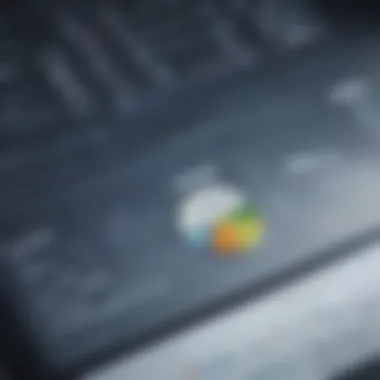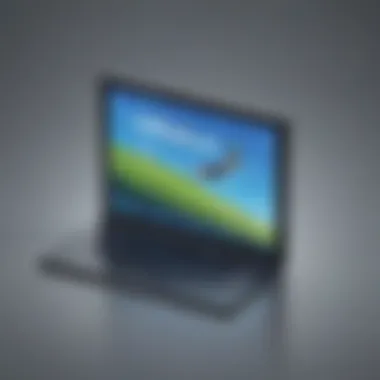In-Depth Analysis of Windows XP Sale: Historical Significance and Market Dynamics Unveiled


Overview of Windows XP: A In-Depth Analysis
Windows XP, a staple in the history of operating systems, holds a unique position in the evolution of technology. Its sale and distribution have sparked numerous discussions and debates within the tech community due to its lasting relevance and impact on the modern tech landscape. As we embark on this comprehensive analysis, we will navigate through the intricate details surrounding the sale of Windows XP, shedding light on its historical significance, market dynamics, and implications in today's ever-evolving technological sphere.
Historical Significance of Windows XP
When delving into the sale of Windows XP, one cannot overlook its historical significance. Launched by Microsoft in 2001, Windows XP quickly became a cornerstone in the realm of personal computing. Its intuitive user interface, enhanced stability, and robust features revolutionized how individuals interacted with their computers. Despite its age, Windows XP continues to evoke nostalgia among users who experienced its key role in shaping the digital landscape of the early 2000s.
Market Dynamics Surrounding Windows XP
The market dynamics surrounding the sale of Windows XP offer a glimpse into the interplay between technological innovation and consumer demand. Despite the discontinuation of official support by Microsoft in 2014, the operating system persists in certain contexts due to compatibility needs and user preferences. This longevity poses intriguing questions about the sustainability of legacy systems in a tech environment dominated by rapid advancements and ever-changing hardware requirements.
Implications for Today's Tech Landscape
Analyzing the implications of Windows XP's sale for today's tech landscape unveils a multifaceted perspective on software longevity, security risks, and the intersection of legacy technologies with modern computing paradigms. By exploring these implications, we can draw parallels between past decisions in the tech industry and current challenges faced by organizations striving to balance innovation with continuity.
Conclusion
Introduction to Windows XP
Windows XP holds a vital place in the realm of operating systems, tracing back its significance to the intricate history of computing evolution. As we embark on this journey of exploration, it is essential to grasp the pivotal role that Windows XP played in shaping the tech landscape. From its unique features to the simplistic user interface, Windows XP revolutionized how individuals interacted with computers, setting a foundation for modern operating systems to build upon.
Historical Context
Evolution of Windows Operating Systems


The evolution of Windows Operating Systems signifies a transformative era in the technological domain. With each iteration, Microsoft strived to enhance user experience, functionality, and security protocols. Windows XP emerged as a milestone release, bridging the gap between consumer needs and technological advancements. Its robust architecture laid the groundwork for subsequent Windows versions, emphasizing stability and performance. Despite facing criticisms for security vulnerabilities, Windows XP garnered unwavering loyalty from users worldwide.
Impact of Windows XP Release
The impact of the Windows XP release reverberated across the tech industry, reshaping standards and expectations. Its user-friendly interface and broad compatibility drew in a vast user base, solidifying Microsoft's position as an OS market leader. Windows XP's release marked a shift towards a more intuitive computing experience, opening doors to new possibilities in software development and user interaction. However, as technology progressed, Windows XP's limitations became evident, necessitating the need for innovation and adaptation.
Features and Functionality
Key Features of Windows XP
Windows XP boasted a plethora of key features that set it apart from its predecessors. The introduction of the updated Start menu, Taskbar, and File Explorer streamlined user navigation and productivity. Enhanced multimedia capabilities provided users with a richer multimedia experience, encompassing digital music, photos, and videos. Despite its enhanced features, Windows XP faced challenges in security management, prompting critical updates and service packs to address potential vulnerabilities.
User Interface Enhancements
User interface enhancements in Windows XP brought about a visual overhaul that resonated with users. The revised design elements, including visual styles, themes, and desktop backgrounds, offered users customization options to personalize their computing environment. Alongside improved visual aesthetics, Windows XP's user interface optimizations aimed to simplify user interactions and accessibility. However, the transition to a modernized interface also posed compatibility issues for legacy applications, requiring users to adapt to evolving software requirements.
Significance of Windows XP Sale
Windows XP represents a pivotal point in the evolution of operating systems. Its sale holds significant importance in the tech industry due to various reasons. Firstly, the enduring popularity of Windows XP among certain user segments highlights the nostalgia and comfort associated with this OS. Additionally, the aftermarket demand for Windows XP showcases a unique market dynamic where older technologies retain value despite newer alternatives. Understanding the significance of Windows XP sale requires a deep dive into market trends and user preferences that continue to shape the tech landscape.
Market Dynamics
Analysis of Demand for Windows XP
The analysis of demand for Windows XP unveils intriguing insights into consumer behavior within the tech market. Despite the discontinued support from Microsoft, there remains a steady interest in acquiring Windows XP licenses. This demand stems from both individual users seeking a familiar platform and organizations relying on legacy systems for specific software compatibility. The unique selling proposition of Windows XP lies in its stability and simplicity, making it a preferred choice for those averse to drastic interface changes. However, the lack of security updates poses a significant disadvantage in today's cyber threat landscape.
Impact on Tech Industry Players


The impact of Windows XP sale on tech industry players is multi-faceted. For software developers, it presents challenges in maintaining compatibility with an outdated platform while catering to users still operating on Windows XP. This niche market segment creates opportunities for companies specializing in legacy system support but also necessitates a delicate balance between past and present technologies. Tech giants must address the implications of continued Windows XP usage on overall system security and user experience. Managing this legacy OS's impact requires a strategic approach that considers both consumer demand and industry standards.
Legal and Licensing Considerations
Issues Surrounding End-of-Life Support
Navigating the issues surrounding end-of-life support for Windows XP poses ethical and practical dilemmas for users and organizations. While Microsoft officially ended support for Windows XP in 2014, many users continue to rely on this OS for various reasons. The lack of security patches and updates exposes these users to potential vulnerabilities, raising concerns about data protection and system integrity. Organizations must consider the legal implications of running Windows XP in regulated industries where data security is paramount. Balancing the benefits of Windows XP's familiarity with the risks of using an unsupported system requires a nuanced approach.
Resale Regulations
Resale regulations surrounding Windows XP licenses add a layer of complexity to the sales landscape. The transfer of Windows XP licenses in secondary markets requires adherence to licensing agreements set forth by Microsoft. Understanding and complying with these regulations is essential for individuals and businesses engaging in the resale of Windows XP licenses. Unauthorized distribution of Windows XP licenses can lead to legal repercussions, affecting both buyers and sellers. Navigating the resale regulations demands a thorough knowledge of software licensing terms and the implications of non-compliance within the tech industry.
Implications for Tech Enthusiasts
Delving into the ramifications for tech enthusiasts regarding Windows XP's sale is imperative in this article, as it sheds light on how individuals passionate about technology can navigate the landscape. As technology evolves rapidly, users must grapple with the compatibility and security concerns associated with outdated systems like Windows XP. Tech enthusiasts, known for their keen interest in exploring new advancements, must consider the risks posed by running an operating system lacking essential updates and security patches. This section will address the critical considerations tech enthusiasts need to contemplate, outlining mitigation strategies and alternative upgrading options to stay abreast of the evolving tech environment.
Compatibility and Security Concerns
Risks Associated with Outdated Systems:
Analyzing the risks entwined with operating outdated systems like Windows XP holds paramount importance in understanding the broader implications for tech enthusiasts. These risks stem from vulnerabilities that remain unaddressed due to discontinued support and pose significant threats to data security and system integrity. The absence of regular updates renders the system susceptible to malware attacks, potentially compromising sensitive information and user privacy. Despite its familiarity, Windows XP's outdated infrastructure lacks the robust security features crucial for safeguarding against modern cyber threats, underscoring the necessity for users to transition to more secure alternatives.
Mitigation Strategies:
Exploring mitigation strategies becomes crucial to mitigate the risks inherent in outdated operating systems. Implementing stringent security protocols, such as firewalls and antivirus software, can bolster the system's defenses against cyber intrusions. Additionally, regular system backups and data encryption serve as proactive measures to safeguard vital information from potential breaches. Tech enthusiasts must proactively monitor and update their systems to fortify their resilience against evolving cyber threats. While the allure of Windows XP's familiarity persists, adopting robust mitigation strategies is essential to bolster system security and mitigate potential risks effectively.
Alternatives and Upgrading Options


Transition to Modern Operating Systems:
Navigating the transition from Windows XP to modern operating systems represents a critical paradigm shift for tech enthusiasts seeking enhanced performance and security. Modern operating systems offer advanced features, improved compatibility, and robust security measures absent in legacy systems like Windows XP. Embracing modern operating systems ensures access to the latest software innovations, optimized performance, and fortified security protocols, enhancing the overall user experience. Despite the initial learning curve associated with transitioning, the benefits of modernization far outweigh the challenges, positioning tech enthusiasts at the forefront of technological advancements.
Migration Best Practices:
Exploring migration best practices equips tech enthusiasts with the necessary tools to seamlessly transition from Windows XP to modern operating systems. Conducting comprehensive system backups, ensuring software compatibility, and familiarizing oneself with the new interface are crucial steps in facilitating a smooth migration process. Tech enthusiasts must prioritize thorough research, seek expert guidance, and engage in rigorous testing to mitigate potential disruptions during the migration phase. By adhering to migration best practices, tech enthusiasts can optimize the migration process, minimize downtime, and maximize the benefits of transitioning to modern operating systems.
This detailed exploration offers tech enthusiasts a comprehensive guide to navigating the implications associated with Windows XP's sale, emphasizing the importance of staying abreast of technological advancements and prioritizing system security in an ever-evolving tech landscape.
Future Outlook and Closing Thoughts
In delving into the Future Outlook and Closing Thoughts of Windows XP, it is imperative to grasp the lasting impact of this venerable operating system. As technology continually evolves, Windows XP leaves behind a legacy that influences subsequent Windows versions and shapes the tech industry's trajectory. Reflecting on this stalwart system bestows insights into the essence of technological progress and innovation. Through careful consideration of its continued relevance and historical context, we gain a nuanced perspective on the evolving nature of operating systems.
Legacy of Windows XP
Influence on Subsequent Windows Versions
The Influence on Subsequent Windows Versions by Windows XP is a pivotal aspect to explore in this comprehensive analysis. Windows XP laid the groundwork for future iterations, setting a benchmark for user-friendly interfaces and robust functionality. Its seamless integration of features and stability contributed significantly to the popularity of subsequent Windows releases. The enduring influence of Windows XP underscores the importance of user-centric design and system reliability, paving the way for advancements in operating system development.
Enduring Popularity
Windows XP's Enduring Popularity is essential to acknowledge when gauging its significance. Despite technological advancements and the introduction of newer systems, Windows XP retains a dedicated user base due to its reliability and familiarity. The enduring popularity of Windows XP serves as a testament to its unparalleled functionality and user appeal. While newer operating systems offer enhanced features, the nostalgia and efficiency of Windows XP continue to resonate with users, highlighting the timeless quality of this iconic system.
Reflections on Technological Progress
Evolution of Operating System Landscape
The Evolution of Operating System Landscape encapsulates the vast changes witnessed in the tech industry over the years. From the primitive interfaces of early operating systems to the sophisticated user experiences of contemporary systems, the evolution is profound. Windows XP played a pivotal role in shaping this landscape, introducing innovative features that set new standards for user interaction and system performance. Examining this evolution provides valuable insights into the iterative nature of technology and the imperative of adapting to meet evolving user needs.
Impact of Innovation
The Impact of Innovation spurred by Windows XP's legacy is a crucial aspect of technological progress. By fostering a culture of innovation and continuous improvement, Windows XP catalyzed advancements in operating system design and functionality. The emphasis on user experience and system reliability set a precedent for future innovations, influencing the way technology is perceived and utilized. Understanding the impact of innovation driven by Windows XP provides a roadmap for future developments and underscores the significance of user-centric design in shaping the tech landscape.



